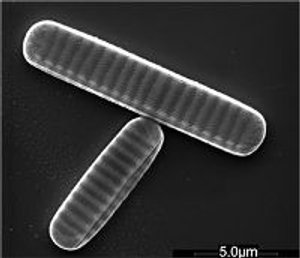
Diatoms are microscopic unicellular algae distributed throughout the world's marine and freshwater ecosystems, including ice systems. Numerous estimates suggest that, as a group, these organisms are responsible for as much as 20% of global photosynthesis, which is comparable to the amount of primary productivity generated by all the terrestrial rainforests combined. In polar regions, where extensive permafrost and glaciers limit the amount of photosynthesis possible on land, diatoms are responsible for a huge fraction of primary productivity and therefore also for carbon sequestration. Polar diatoms are adapted to cold temperatures and high salinities and they live both within the seawater and the brine channels formed within sea ice. They serve as the base of the entire polar food web. Polar regions are displaying the greatest responses to climate change, with increased melting of sea ice and the potential disruption of this sensitive ecosystem. The whole genome sequencing of a representative polar diatom was proposed in order to gain insights into how these organisms have adapted to the extreme environments in which they thrive.
Fragilariopsis cylindrus is regarded as a typical cold-water species found in Arctic and Antarctic sea water and sea ice. It can form large ice-edge blooms and is regularly detected in sea ice investigations. To date, prokaryotes are the only psychrophilic (cold-loving) organisms for which whole genome sequences exist. The whole genome sequencing of F. cylindrus will provide the first insights into a psychrophilic eukaryotic organism with compelling ecological and biotechnological applications. The whole genome sequences of the temperate diatoms Thalassiosira pseudonana, Phaeodactylum tricornutum, and Pseudonitzschia multiseries will provide a basis for comparative analysis with the psychrophilic F. cylindrus. The genome of F. cylindrus will provide insights into the unique physiology of polar-adapted eukaryotes and allow for better predictions of the impact climate change may have on organisms that serve as the basis for all polar ecosystems.
Genome Reference(s)
Mock T, Otillar RP, Strauss J, McMullan M, Paajanen P, Schmutz J, Salamov A, Sanges R, Toseland A, Ward BJ, Allen AE, Dupont CL, Frickenhaus S, Maumus F, Veluchamy A, Wu T, Barry KW, Falciatore A, Ferrante MI, Fortunato AE, Glöckner G, Gruber A, Hipkin R, Janech MG, Kroth PG, Leese F, Lindquist EA, Lyon BR, Martin J, Mayer C, Parker M, Quesneville H, Raymond JA, Uhlig C, Valas RE, Valentin KU, Worden AZ, Armbrust EV, Clark MD, Bowler C, Green BR, Moulton V, van Oosterhout C, Grigoriev IV
Evolutionary genomics of the cold-adapted diatom Fragilariopsis cylindrus.
Nature. 2017 Jan 26;541(7638):536-540. doi: 10.1038/nature20803
